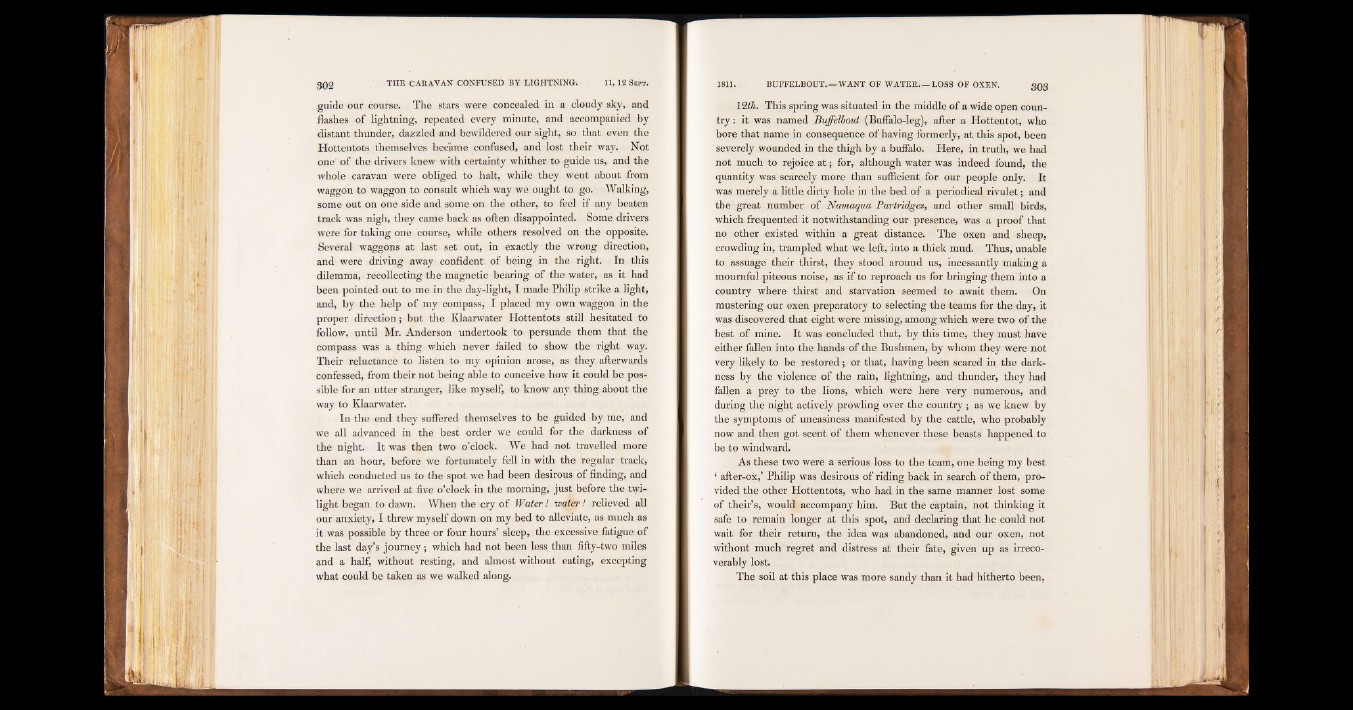
guide our course. The stars were concealed in a cloudy sky, and
flashes of lightning, repeated every minute, and accompanied by
distant thunder, dazzled and bewildered our sight, so that even the
Hottentots themselves became confused, and lost their way. Not
one of the drivers knew with certainty whither to guide us, and the
whole caravan were obliged to halt, while they went about from
waggon to waggon to consult which way we ought to go. Walking,
some out on one side and some on the other, to feel if any beaten
track was nigh, they came back as often disappointed. Some drivers
were for taking one course, while others resolved on the opposite.
Several waggons at last set out, in exactly the wrong direction,
and were driving away confident of being in the right. In this
dilemma, recollecting the magnetic bearing of the water, as it had
been pointed out to me in the day-light, I made Philip strike a light,
and, by the help of my compass, I placed my own waggon in the
proper direction; but the Klaarwater Hottentots still hesitated to
follow, until Mr. Anderson undertook to persuade them that the
compass was a thing which never failed to show the right way.
Their reluctance to listen to my opinion arose, as they afterwards
confessed, from their not being able to conceive how it could be possible
for an utter stranger, like myself, to know any thing about the
way to Klaarwater.
In the end they suffered themselves to be guided by me, and
we all advanced in the best order we could for the darkness of
the night. It was then two o'clock. We had not travelled more
than an hour, before we fortunately fell in with the regular track,
which conducted us to the spot we had been desirous of finding, and
where we arrived at five o’clock in the morning, just before the twilight
began to dawn. When the cry of Water I water! relieved all
our anxiety, I threw myself down on my bed to alleviate, as much as
it was possible by three or four hours’ sleep, the excessive fatigue of
the last day’s journey; which had not been less than fifty-two miles
and a half, without resting, and almost without eating, excepting
what could be taken as we walked along.
12£&. This spring was situated in the middle of a wide open country:
it was named Buffelbout (Buffalo-leg), after a Hottentot, who
bore that name in consequence of having formerly, at. this spot, been
severely wounded in the thigh by a buffalo. Here, in truth, we had
not much to rejoice a t ; for, although water was indeed found, the
quantity was scarcely more than sufficient for our people only. It
was merely a little dirty hole in the bed of a periodical rivulet; and
the great number of Namaqua Partridges, and other small birds,
which, frequented it notwithstanding our presence, was a proof that
no other existed within a great distance. The oxen and sheep,
crowding in, trampled what we left, into a thick mud. Thus, unable
to assuage their thirst, they stood around us, incessantly making a
mournful piteous noise, as if to reproach us for bringing them into a
country where thirst and starvation seemed to await them. On
mustering our oxen preparatory to selecting the teams for the day, it
was discovered that eight were missing, among which were two of the
best of mine. It was concluded that, by this time, they must have
either fallen into the hands of the Bushmen, by whom they were not
very likely to be restored; or that, having been scared in the darkness
by the violence of the rain, lightning, and thunder, they had
fallen a prey to the lions, which were here very numerous, and
during the night actively prowling over the country; as we knew by
the symptoms of uneasiness manifested by the cattle, who probably
now and then got scent of them whenever these beasts happened to
be to windward.
As these two were a serious loss to the team, one being my best
‘ after-ox,’ Philip was desirous of riding back in search of them, provided
the other Hottentots, who had in the same manner lost some
of their’s, would accompany him. But the captain, not thinking it
safe to remain longer at this spot, and declaring that he could not
wait for their return, the idea was abandoned, and our oxen, not
without much regret and distress at their fate, given up as irrecoverably
lost.
The soil at this place was more sandy than it had hitherto been,